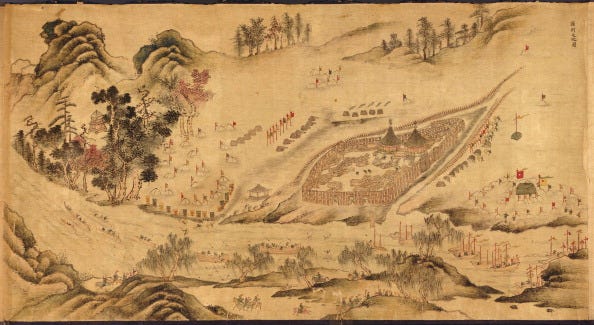One way to understand the special trajectory of Kyiv is to compare it to the other outcomes of the Mongol invasions. As we have seen, most of the territory of Rus, including Kyiv, became part of the Grand Duchy of Lithuania. The lands of far western Rus, Galicia and Volhynia, remained as states for about a century before being absorbed by Poland and Lithuania. The Crimean peninsula, in the south of what is now Ukraine, was never actually part of Rus, became the site of a Mongol successor state.
The same was true of the lands of the northeast of Rus, centered around the new town of Moscow. While Kyiv yielded its civilization to Vilnius, Moscow was a site of tribute collection for the Mongols, and its rulers were chosen accordingly. Once these rulers were able to assert themselves independently, they quickly established a huge new state, expanding first to the south into largely Muslim territories, then eastward across Asia, mainly in search of furs. Its highly centralized state thus enriched and empowered, Moscow could turn towards Europe in the seventeenth and eighteenth centuries.
You can find the video for the lecture here and the podcast here or here.
Reading: Robert Crummey, The Formation of Muscovy 1304-1613, London: Longman, 1987, 1-29, 84-115, 143-178.
Terms:
Metomorphoses of Ovid
Shakespeare, Hamlet
Harold Hardrade (King of Norway)
Chaucer, Canterbury Tales, 1380
Lithuania, Galicia-Volhynia, Moscow
Lithuanian Rus, Galician Volhynian Rus, Mongol Rus
Grand Prince Danylo, d. 1265, Galicia-Volhynia
Mongol successor states: Crimean khanate, Kazan khanate, Nogai horde, Moscow
Yuri, prince of Moscow, marries 1317
Vasily, prince of Moscow, 1289-1299, coin
Novgorod
Pskov
Veche bell
Riazan
Ivan IV the Terrible r. 1547-1584
Livonian Wars
oprichnina, from 1564
Ermak
Sibir, Siberia
Treaty of Nerchinsk, 1689





Meanwhile, ICC issues arrest warrant for Putin The Terrible. 🥷🏻
Thank you for sharing these lectures here! I "attended class diligently," during your course, and learned so much. I have done a lot of reading on Eastern & Central European history, but still learned far more here!
I look forward to hearing your thoughts and comments on the ICC's actions on Russia's (Putin's) war crimes.